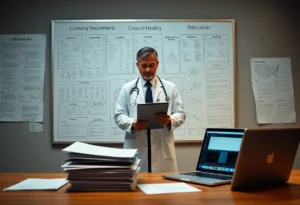You are about to commence on an exciting journey of relocating for your medical career, and a well-structured plan can make all the difference. This step-by-step guide will help you navigate the complexities of the house-hunting and moving process, tailored specifically for medical professionals. From researching the best neighborhoods to finding suitable accommodations, you’ll gain insights that will ease your transition and ensure a smooth move-in. Let’s get started on making your relocation as seamless as possible!

Setting Your Sight: Finding the Right Neighborhood
Choosing the right neighborhood can have a profound impact on your overall experience during your relocation. You want to find an area that not only suits your lifestyle but also facilitates your daily commuting needs and personal preferences. Factors such as proximity to important amenities, the quality of local schools, and the character of the community should be top of mind as you commence on this search.
Identifying Proximity to Medical Facilities and Schools
Access to medical facilities and schools is vital for you and your family. Researching local hospitals, clinics, and educational institutions should be a priority. A neighborhood located near reputable medical centers can enhance your peace of mind, knowing that you have immediate access to health services, should the need arise. Similarly, proximity to quality schools can ease the transition for your children and provide them with solid educational foundations.
Evaluating Safety and Community Culture
Safety is a significant consideration when selecting your new neighborhood. Delve into crime statistics and local safety reports to understand the area better. Beyond numbers, community culture plays a pivotal role in your quality of life. Engaging with local residents, visiting community events, or checking online forums can provide insights into the vibe of the neighborhood—whether it’s family-friendly, quiet, or a hub for young professionals. Embracing aspects such as recreational activities, local parks, and community support groups can make a world of difference in helping you feel at home.
Budgeting for Your Move: Financial Planning Essentials
Establishing a budget for your relocation is the cornerstone of a smooth transition. By identifying all potential expenses ahead of time, you can avoid financial surprises that could derail your moving plans. Evaluate costs such as moving services, temporary housing, utility setup fees, and any deposits needed for your new residence. Setting a clear financial framework enables you to allocate funds effectively, ensuring that each aspect of your move is accounted for in your total budget.
Estimating Relocation Costs and Expenses
Breaking down relocation costs involves several key elements, including moving company fees, travel expenses, and the price of new furnishings, if needed. Depending on the distance of your move and the size of your household, costs can significantly vary. On average, hiring professional movers can range from $800 to $2,500, while DIY moving options may save you money but involve rental truck expenses and labor costs. Clearly outlining these factors will help you devise a practical and realistic budget.
Understanding Local Real Estate Trends
A thorough analysis of local real estate trends directly impacts your relocation budget. Researching the average price per square foot, rental rates, and housing availability in your new area informs your decision-making process. Current trends can suggest whether it’s better to rent or buy, as some markets remain more favorable for renting due to escalating home prices. By staying updated on these patterns, you can negotiate better deals and secure accommodations that align with your financial plan.
Monitoring real estate trends requires tapping into local resources like neighborhood reports and online platforms that aggregate housing data. For instance, areas experiencing job growth often see increased demand for housing, leading to higher prices. Alternatively, regions struggling with local economies may offer lower prices or incentives for new residents. You can also connect with real estate agents who have deep insights into market conditions and can provide tailored guidance based on your unique budget and moving timeline.
Navigating the Housing Market: Search Strategies for Medical Staff
Finding the right home in a new city requires strategic searching tailored to your needs as a medical professional. Begin by determining your preferred neighborhoods based on your workplace location, lifestyle preferences, and budget. Attend open houses, browse local listings, and consider scheduling viewings during off-hours for a more personal experience. By being proactive and informed, you’ll increase your chances of finding a home that meets your specific requirements.
Utilizing Specialized Real Estate Agents
Collaborating with a real estate agent who understands the unique needs of medical staff can streamline your home search. These professionals often have access to off-market listings, insights on local neighborhoods, and can negotiate on your behalf. Their understanding of the housing market can help you secure a property that fits your lifestyle and budget efficiently.
Leveraging Online Resources and Tools
Online resources play a vital role in your home search. Websites like Zillow, Realtor.com, and Redfin allow you to filter options by price, size, and location. Social media platforms can also provide insights through local community groups and recommendations, giving you firsthand accounts of neighborhoods. Furthermore, mobile apps enable you to track new listings and receive updates, ensuring you’re always in the loop.
Utilizing these online tools goes beyond just browsing listings; they offer innovative features such as virtual tours and neighborhood statistics. For instance, using a combination of Google Maps and real estate sites can help you gauge commuting times and nearby amenities, which is particularly beneficial for busy medical staff. Filtering properties with school ratings or hospital proximity ensures you make informed decisions, ultimately leading to a happier living situation.
Once You’ve Found It: The Inspection and Negotiation Process
Securing your dream home involves more than just locking in a deal; the inspection and negotiation process is critical. Once you’ve found a property that meets your needs, ensuring it’s in good shape is necessary to avoid costly surprises later. A detailed home inspection will provide insights into the property’s condition, allowing you to negotiate terms that protect your investment and facilitate a smooth transition into your new life.
Key Home Inspection Considerations
Prioritize key areas during your home inspection, including structural integrity, plumbing, electrical systems, and HVAC functionality. Pay attention to signs of water damage or mold, as these can indicate larger issues. Engaging a certified inspector familiar with the local market conditions can provide you invaluable insights and help assess whether the home is fairly priced based on its condition.
Effective Negotiation Tactics for Medical Professionals
Leverage your unique position and negotiation skills by highlighting your qualifications and stability as a medical professional. Present your findings from the inspection to justify your offers or requests for repairs. Using comparable sales data in the area can strengthen your case, showcasing your thorough market understanding and representing you as a serious buyer. Collaboration with a skilled real estate agent adept in negotiation can further enhance your approach.
Effective negotiation tactics for medical professionals often hinge on their strong analytical and communication skills. Frame your negotiation discussions grounded in empirical data, such as statistics on local property values and recent sales, to bolster your arguments. This places you in a better position when making counteroffers, especially if the inspection reveals necessary repairs. Approach negotiations as a partnership, focusing on mutual benefit, and maintain professionalism to foster positive discussions that could lead to favorable terms.
Moving Day Logistics: Simplifying the Transition
Managing moving day logistics is important for a streamlined transition. Coordinating timing with moving professionals, ensuring utilities are activated in your new home, and keeping important items easily accessible transforms a potentially chaotic day into a manageable process. Outline responsibilities among family members or roommates, and create a checklist of tasks to ensure nothing slips through the cracks as you commence on this exciting new chapter.
Organizing and Packing Efficiently
Packing efficiently can significantly ease your moving day. Categorize your belongings by room and purpose, using clear labels for boxes to avoid confusion at your new address. Consider packing importants separately so that crucial items like toiletries, clothes, and important documents remain accessible during your transition. This not only saves time but also alleviates stress during unpacking.
Choosing the Right Moving Services
Selecting the right moving services can make a world of difference on moving day. Research various companies, comparing reviews, pricing, and specific services offered to find the best fit for your needs. Inquire about their experience with medical staff relocations, as they may have insight into unique requirements, such as managing specialty equipment or accommodating tighter schedules. A well-informed decision here will enhance your experience and reduce potential headaches on the actual day of the move.
Settling In: Integrating into Your New Community
Finding your footing in a new environment often starts with immersing yourself in the community. Engage with local events, join resident groups, and explore neighborhood attractions. Attending workshops, festivals, or community meetings can provide insights into local culture while helping you forge bonds with your neighbors. Familiarize yourself with the area, and remember that relationships built during this time can greatly enhance your overall experience as you transition into your new role.
Building Connections in the Medical Network
Your professional network is vital in a new city, making it beneficial to connect with colleagues in the local healthcare community. Attend conferences, join medical associations, or participate in volunteer events to meet fellow medical professionals. This proactive approach not only expands your contacts but can also lead to mentorship opportunities and collaborations in your new role.
Exploring Local Resources and Amenities
Getting acquainted with local resources streamlines your integration process. Discover vital services like grocery stores, hospitals, gyms, and parks that cater to your daily needs. Familiarizing yourself with nearby public transport options also eases commuting challenges and enhances your overall lifestyle in the new area.
Knowing the amenities at your disposal allows you to tailor your routine for convenience and enjoyment. For instance, if you enjoy fitness, locate nearby gyms or fitness classes, while families should seek out parks and recreational facilities for children. Additionally, explore cultural venues, such as museums and theaters, which often host community events that may pique your interest and connect you with others. Understanding these local offerings not only simplifies day-to-day life but also enables you to engage and bond with your new community more effectively.




